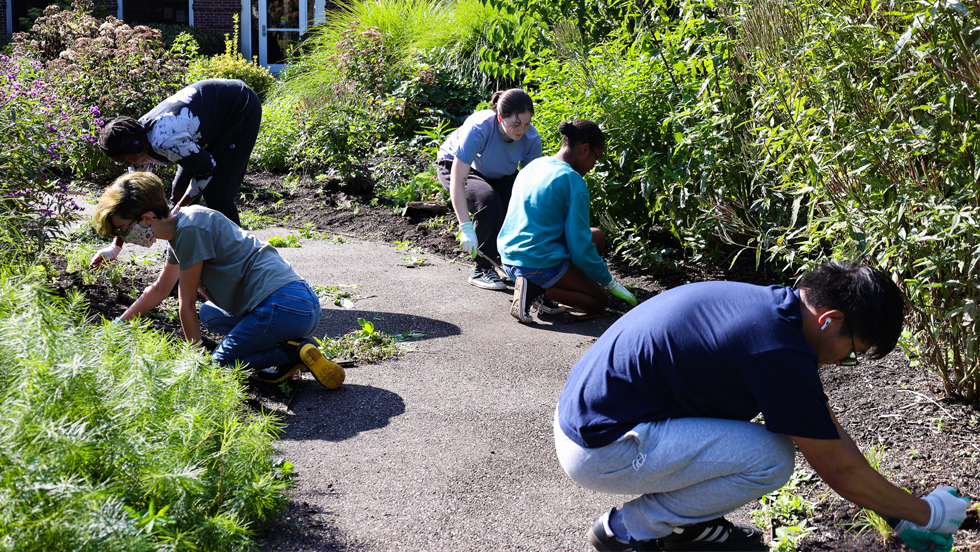
Biology professor Matthias Foellmer, PhD, is giving native plants and local pollinators a newly renovated home on our 70-acre organic campus arboretum.
The native plant garden at the entrance to Alumnae Hall has been a habitat for many insects since 2017. Matthias Foellmer, PhD, a professor of biology who specializes in ecology and entomology, initiated the creation of this garden because of his concern for Long Island’s habitat loss for native pollinators. “While our Garden City campus is very green, with many trees and ornamental plants, there was a noticeable paucity of butterflies and other native pollinators,” he said. “The native plant garden provides food and habitat not only for threatened bees and butterflies, such the well-known monarch butterfly, but also for birds.”

Isabella Migani helps prepare the soil.
The initial design was to create what’s called a “wild garden,” which is planned but then allows nature to take its course. This holds the highest ecological value, said Dr. Foellmer, because “the entire space is essentially left undisturbed by humans except for detailed weed removal. However, the latter part is labor intensive and requires expertise.” During the pandemic, when regular garden maintenance by Dr. Foellmer and the Adelphi landscaping staff was not possible, weeds, and particularly sumac, started to overgrow and crowd out many of the native plants.
Beginning the Redesign
A redesign was in order. Early in 2022, Dr. Foellmer and Bob Conaghan, associate director of facilities, met with professional landscape designer Lara Barausky da Silva, who developed the plan for the redesign of the garden. “With the new design, the native plant garden will follow a more traditional approach,” Dr. Foellmer said, “with mulch in between designated groups of plantings, making maintenance more manageable and attractive for volunteers. Importantly, the garden will still be of high ecological value for pollinators and birds.”
The first phase of the redesign involved removing all existing aboveground vegetation, except for woody viburnum bushes, and applying a soil and cardboard layer to slow any regrowth. After that, the regrowing sumac was eliminated, while desired plants began to reestablish.
The second phase started this year with the support of Adelphi Provost and Executive Vice President Christopher Storm, PhD, who provided the funds for purchasing the plants. In July, Dr. Foellmer planted more than 20 perennials, and on September 20, 14 students from his botany class assisted in adding 550 plants in the form of plugs.
“Pollinators and other beneficial insects are threatened not only because of habitat loss but also because of pesticides that are used in gardens and golf courses,” Dr. Foellmer explained. “But our native plant garden, much like the Adelphi campus, does not use any pesticides—rather an organic way of management, which makes it a safe home for insects. It is in direct sunlight as well, which is beneficial for the growth of the plants and does not require much water. Setting areas aside to plant native plants that support our native pollinators is very important.”

Students delve in as the replanting process begins.
The Garden Acts as an Educational Tool
The garden also acts as a learning tool for students. They learn how to care for a garden, as well as how to identify different plants and pollinators and understand what’s beneficial to them and what is not. In addition, the garden helps students become more informed citizens. Understanding how we can help our environment is the first step, and after that comes what they can do for their own gardens and how to inspire others to grow native plants as well.
Junior Michaela Pechie, a student who’s helping with the redesign of the garden, said, “[The garden] really helps to sustain the animals here and new species, so it’s good to plant a garden where we can learn about them and also where they can thrive.”
After the planting session, “the students expressed that they really enjoyed the planting,” Dr. Foellmer said, adding, “After all, everybody was happy to be outside on a nice, sunny morning.”